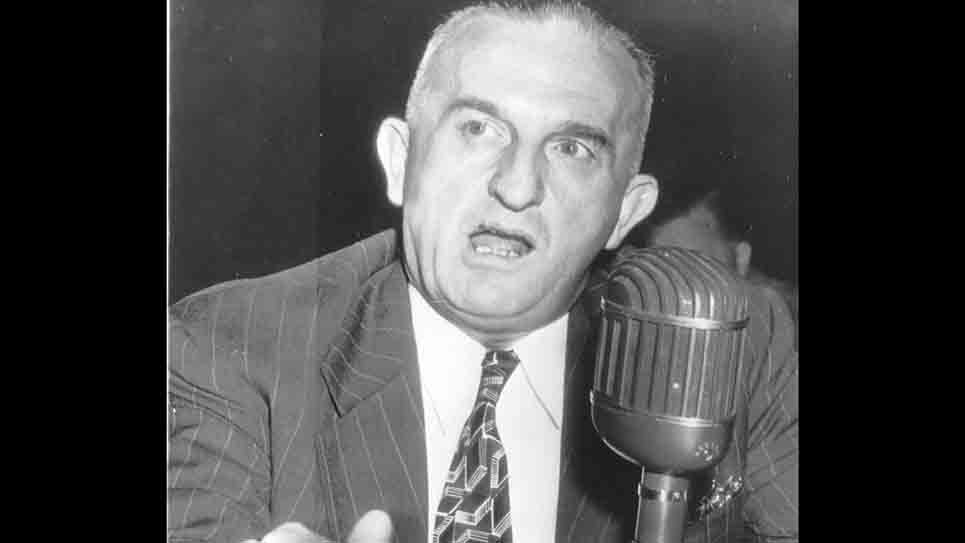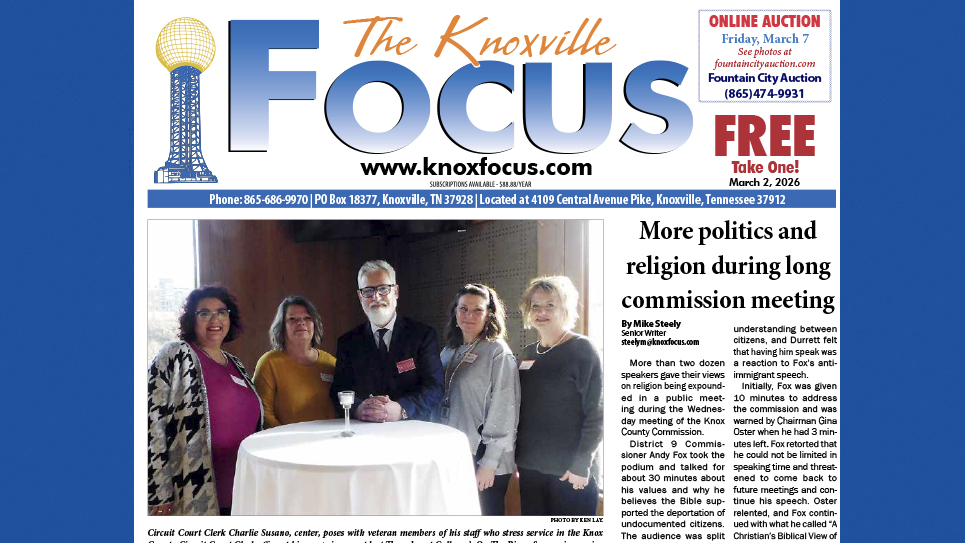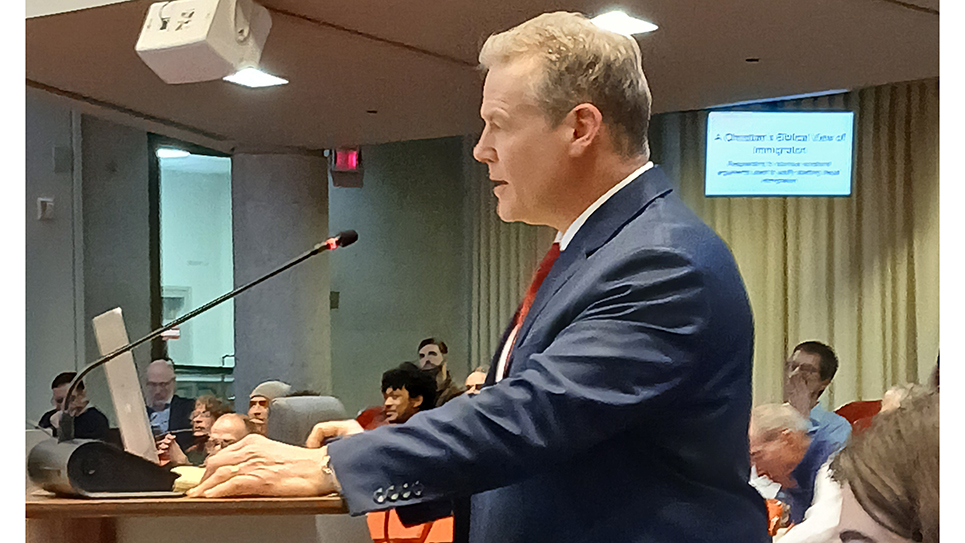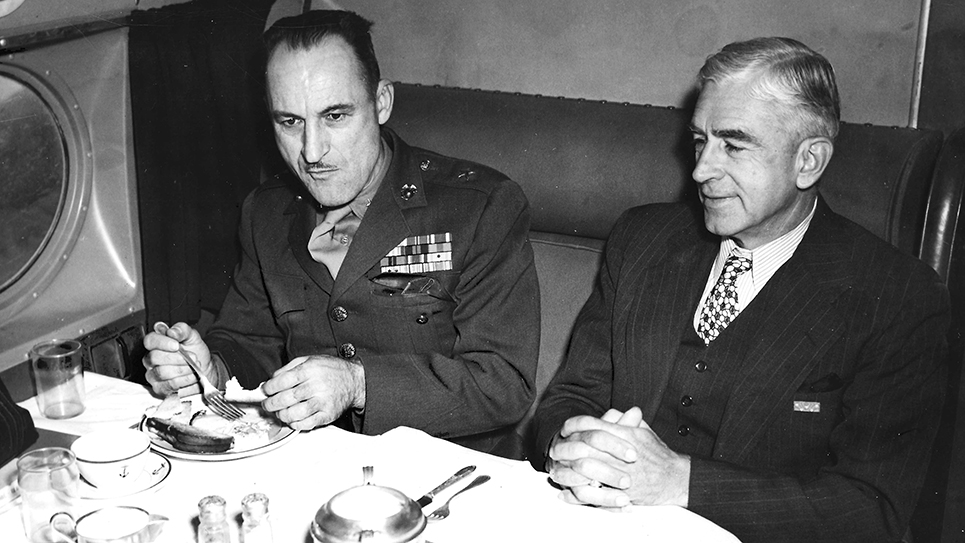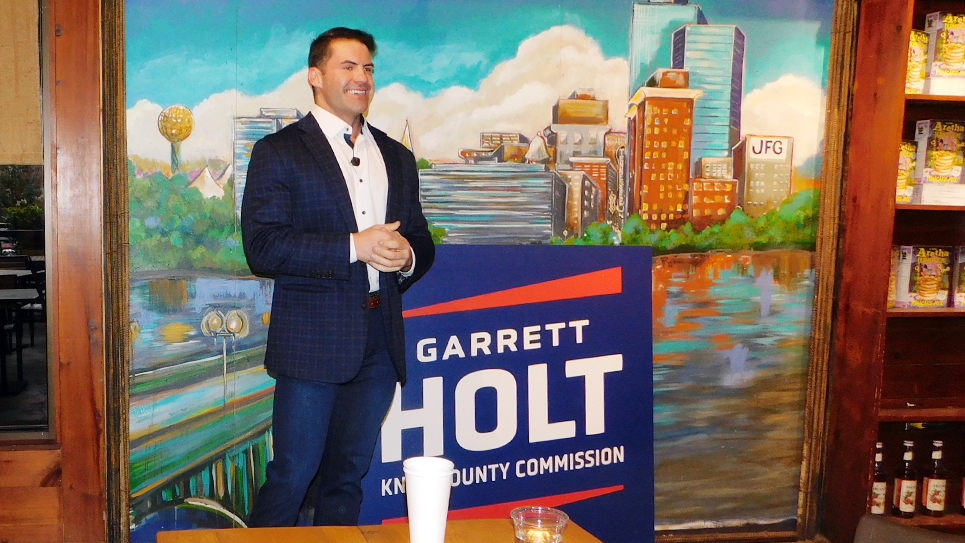Rise & Fall of a Congressman
John M. Coffee of Washington State
By Ray Hill
For a decade, John Main Coffee served in the U.S. House of Representatives. Reporter Jack Pyle of the Tacoma News Tribune summed up Coffee’s career after a failed comeback attempt in 1958, writing the congressman had been “unbeatable up to 1946, and unelectable after that.” Coffee had come to Congress as an ardent supporter of President Franklin D. Roosevelt’s New Deal in 1936. Coffee had done a great many things for Tacoma and Pierce County during his ten years in Congress, as well as for many individuals. Burly and possessing a fine mind, John Coffee had been an opponent of Francisco Franco in Spain, against providing scrap iron for the Japanese Empire as it was actively engaged in a bloody conquest of China, and foe of big business. Coffee was for expanding the role of government and backing organized labor.
Times change, as do people’s feelings about the issues confronting the country. John M. Coffee lost his seat in the House of Representatives likely for two reasons; the first being that 1946 was a banner year for GOP candidates who were campaigning on the slogan “Had Enough,” which summarized the frustration of millions of Americans who had suffered deprivations during the Second World War. The other reason was the breath of scandal had seared Coffee through the investigation of the Senate’s Special Committee to Investigate Contracts Under the National Defense Program, better known as the “Truman Committee,” for its first chairman. New York U.S. Senator James Mead inherited the chairmanship after Truman. An investigation of Congressman Andrew Jackson May of Kentucky eventually landed the Bluegrass State lawmaker in the penitentiary. While John Coffee did not go to prison, the revelations from the committee certainly tarnished his reputation during an election year.
John Coffee was a native of Tacoma and graduated from Yale University’s School of Law. Coffee came into politics early, working for the election of Clarence C. Dill to the United States Senate in 1922. Dill defeated Republican incumbent Miles Poindexter and took the 25-year-old Coffee with him to Washington, D.C., as his secretary (chief of staff). Coffee returned to Tacoma, where he practiced law until 1933. With the advent of the New Deal, John M. Coffee became the secretary of the Advisory Board of the National Recovery Administration in the Roosevelt Administration. Coffee simultaneously held the position of appraiser and examiner for Pierce County for the State Inheritance Tax & Escheat Division until his resignation in 1936.
Coffee’s chance to run for Congress came when Wesley Lloyd died on January 10, 1936. Lloyd had been elected to the U.S. House of Representatives in the 1932 Democratic sweep in Washington state. Congressman Lloyd died of a heart attack in Washington, D.C., at age 52. After making his formal announcement as a candidate for the Democratic nomination, John M. Coffee plunged headfirst into the campaign. Coffee campaigned as a supporter of the New Deal and President Roosevelt. On Election Day, Coffee walloped the Republican nominee, winning better than 67% at the peak of the popularity of Franklin Roosevelt and the New Deal.
After winning the election, the congressman-elect promptly contacted Morris Motors, the local Packard dealer in Washington, D.C. When he and Mrs. Coffee arrived in the Capitol at the end of December, awaiting the congressman was a brand-new Packard 120 club sedan. At the time, Packard was the leading luxury automobile in the country. When first elected to Congress, John M. Coffee was only 39 years old. It soon appeared that Coffee had a long political future before him.
Even when the New Deal appeared to be receding in the 1938 election, Congressman Coffee appeared to have solidly entrenched himself inside his district, winning quite nearly 73% of the ballots cast. Coffee was routinely reelected every two years, never dipping below 61% of the vote in the general election.
As a congressman, John Coffee was given to florid pronouncements such as that he made when Japanese forces occupied the Aleutian Islands in Alaska during World War II. During the summer of 1942, Coffee had stated, “There will be an attack on the Alaskan mainland, British Columbia or the Pacific Northwest before the end of the summer.”
John Coffee also delighted in the publicity he oftentimes received, such as when he read excerpts from the private correspondence of Vivien Kellems, a successful Connecticut businesswoman, and Count Frederick von Zedlitz, a Nazi engineer residing in Argentina. It soon became clear the censors who had gone through the private correspondence had somehow leaked at least portions of the letters to muckraking national columnist Drew Pearson, who had in turn shared them with Coffee. The congressman read tidbits of what were obviously love letters causing an epic outburst from Miss Kellems. The Connecticut industrialist gave out a statement to the news media, saying, “The perfect coordination … among Secretary Morgenthau, Mr. Pearson and Mr. Coffee is a joy to behold … Come off the floor of that House, Mr. Coffee, where you are protected by your Congressional immunity …” Miss Kellems raged that “any man who would do what you have done,” meaning Congressman Coffee, “would be publicly horse whipped.” Vivien Kellems had not only at one point denied knowing von Zedlitz, but she also claimed to have turned over valuable evidence on the count to the state department. That was news to the Department of State, which said it found exactly nothing in its files.
Then came the allegation made by a local contractor. The Mead Committee heard testimony from Eivind Anderson, a contractor from Tacoma, who had won a $93,517 bid for a construction job at Fort Lewis. Anderson testified he had met Congressman Coffee in a “narrow, deserted Capitol corridor back in 1941.” According to Anderson, the congressman had said, “I understand from Paul (Paul A. Olson, Coffee’s secretary) that you will pay $2,500 for our representing you here in Washington!” Anderson said he would be happy to pay $2,500 and, again, according to the contractor, Coffee said, “Send it to Paul …”
Naturally, Congressman John M. Coffee came before the Mead Committee to offer his own testimony. “There was never any question of his hiring me,” Coffee insisted. The money given had been a campaign contribution. Had the congressman reported the contribution to the appropriate authority in the House, Senator Homer Ferguson wondered. No, Coffee replied. The congressman replied the law called for “reporting contributions received 10 days before and 30 days after an election.” John Coffee explained that the $2,500 he had received from Eivind Anderson was an “interim contribution.” When asked how the money had been spent, Coffee explained he had used it to reimburse himself for expenses incurred during the 1938 and 1940 campaigns.
For voters at the time, the contribution was significant as it had the same purchasing power today as more than $50,000. While the statute of limitations had run out, had any crime occurred, John M. Coffee would have gotten considerable bad publicity from the episode. It didn’t help that Senator Mead, a Democrat, had referred to Coffee’s acceptance of the contribution as “morally wrong.” Mead’s further observation that the government “did not lose any money” likely didn’t much matter to some voters.
The Spokane Spokesman-Review noted the old adage about “it makes a lot of difference whose ox is gored” that it apparently made a considerable difference in Washington, D.C., as to “whose questionable public activities shall and whose shall not be investigated.” Reporter Harry J. Brown archly noted that it also seemed to make a big difference in whether an investigation was requested by a Democrat or a Republican. Brown wrote that there were lingering questions left hanging following the testimony from the Mead Committee’s investigation. If indeed the $2,500 had been a campaign contribution, why was it made in a year when there was no campaign, Brown wondered. “Usually, campaign contributions are made in the summer and fall of a campaign year; not a year later.”
The Washington Post published an editorial entitled “Public Morals,” which stated Congressman Coffee’s attempt to “sweep away the implications of a $2500 check paid in 1941 to his secretary by a contractor for whom he had gone to bat at the war department by saying that the Mead committee’s decision to look into the case is ‘strictly politics.’” The Post readily acknowledged as two GOP senators had submitted photostats of the $2500 check “there can be little doubt that political motives are involved.” The editorial then stated, “But we fail to see how that minimizes the gravity of Mr. Coffee’s offense against sound political morals.”
The fall of Congressman Andrew J. May had made headlines across the country, and the odor of scandal hung over Congressman John M. Coffee as he entered the 1946 campaign. Coffee faced the same Republican opponent in 1946 as he had in the 1944 election, Thor Tollefson, a name which was evocative of old Viking legends. Tollefson had been the prosecuting attorney for Pierce County.
The 1946 campaign did not go well for the incumbent in several important respects. Coffee, under increasing fire for his left-leaning politics, claimed to have a letter from Congressman Martin Dies Jr., a Texas Democrat nationally known for his chairmanship of the House Un-American Activities Committee. According to Coffee, the purported letter stated that Dies would campaign throughout Washington state at his own expense to proclaim Congressman Coffee’s patriotism. Norman Shut Jr., an enterprising young Republican, telephoned and spoke to Congressman Dies and released a transcript of their conversation. “I had not written to John Coffee offering to go to Washington state to campaign for him or to say anything for or about him,” Dies said. “I am diametrically opposed to Mr. Coffee’s politics and have no intention of speaking in his behalf.”
The statement by Martin Dies undermined John Coffee badly, especially in light of Thor Tollefson having pointed out the congressman had been “identified with 28 Communist front organizations.” “It is hard to believe that Mr. Coffee, the congressman, is the same person as Mr. Coffee, the candidate,” Tollefson said.
Three of Washington’s Democratic congressmen – – – John M. Coffee, Hugh DeLacy and Charles Savage – – – had signed a letter to former Vice President and Secretary of Commerce Henry A. Wallace praising him for his foreign policy stand and asking him to speak in the Evergreen State. The conservative Spokesman-Review published an editorial entitled, “Faithful Trio Hew to the Line.” The editorial flatly accused the congressmen of being “three faithful who don’t deviate in their loyalty to Russia.” The newspaper sarcastically noted that each of the congressmen was against the “capitalistic-imperialistic” Second World War until Hitler violated his pact with Stalin and invaded the Soviet Union.
The battering to his reputation and the scandal helped to take Congressman John M. Coffee under. He lost the general election, winning 46% of the vote. Only 49 years old when he lost his seat in the House, it is hardly surprising that Coffee tried to seek elective office once again. Coffee did not attempt to regain his seat in Congress in 1948, but rather chose to wait until 1950 to wage another campaign for the House. At the time, Washington used a blanket primary with the two top candidates going on to the general election. Congressman Tollefson got better than 51% of the vote against four opponents, including John Coffee, who won only 27%. Coffee fared little better in the general election, polling under 40% against the popular Tollefson.
Eight years later, John M. Coffee made yet another attempt to return to the House. Once again, Coffee trailed Tollefson in the blanket primary, winning only 17% of the vote in a field of seven candidates. In one of the best years for Democrats since 1936, John M. Coffee could muster only 45% of the votes cast. At that point, Coffee knew his political career was over.
The ex-congressman resumed his law practice and remained active until his death on June 2, 1983.
© 2025 Ray Hill

